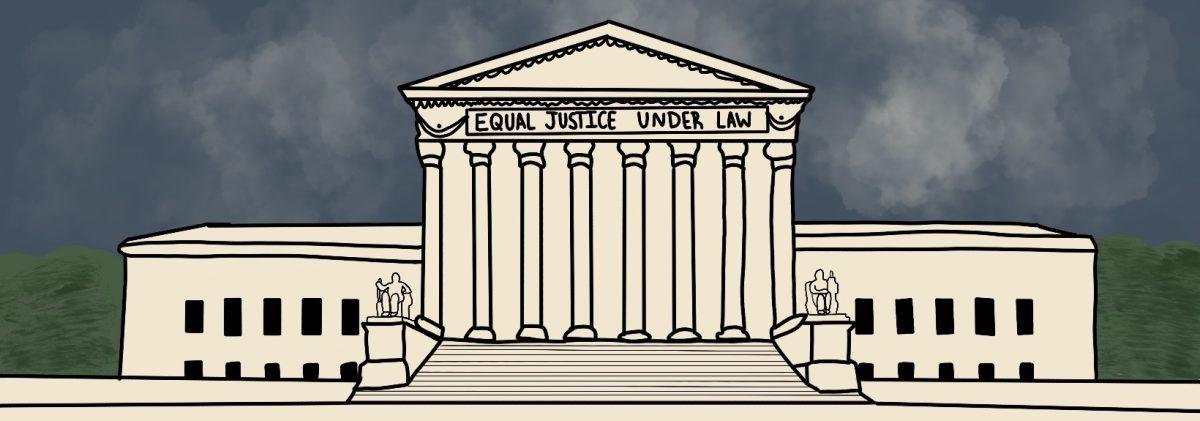
Opinions expressed by The Maneater columnists do not represent the opinions of The Maneater Editorial Board.
Abigail Ramirez is a freshman journalism major at MU. She is an Opinions Editor and a Diversity, Equity and Inclusion Chair who writes political and social commentary for The Maneater.
When former Supreme Court Justice Ruth Bader Ginsburg died, I broke down in tears. Of course I was grieving, but more than anything, I was terrified. Like many other women, I knew the inevitable. I knew that women’s right to choose in the United States would be sent to the guillotine. On Monday, we were introduced to the executioner.
Politico published a draft majority opinion written by Justice Samuel Alito overturning Roe v. Wade, which was leaked by an anonymous source. In his draft, Alito said, “It is time to heed the Constitution and return the issue of abortion to the people’s elected representatives.” Alito also wrote, “Roe was egregiously wrong from the start.”
Allowing states to decide whether to restrict abortion rights will put millions of American women’s lives in danger. The court’s decision to do so, as reflected in this initial drafted opinion, is an act of subjugation and discrimination against women’s autonomy and privacy.
The draft claimed that Roe v. Wade, a 1973 Supreme Court case ruling that restrictive state regulation of abortion was an unconstitutional violation of individuals’ right to privacy, “has had damaging consequences.” However, supporters of this assertion are missing the point.
This is not just an abortion issue. Overturning Roe gives the government a dangerous amount of power over women’s bodies. It would directly allow the government to restrict women’s lives and freedoms.
Such a decision is not only undemocratic; it is subjugation. It is discrimination. It is the solidification of gender inequality in America on a base level, removing the basic human right to bodily autonomy.
Alito claims that “an unbroken tradition of prohibiting abortion on pain of criminal punishment persisted from the earliest days of the common law until 1973.” Yes, criminal punishment for abortion is present throughout American history. But for Justices Alito, Amy Coney Barrett, Brett Kavanaugh, Clarence Thomas and Neil M. Gorsuch — who reportedly backed Alito’s majority opinion — to imply that this period was more just and safe is ironic.
In the 1950s and 1960s, estimates for illegal abortions in the United States ranged from 200,000 to 1.2 million per year, according to Guttmacher, a leading research and policy organization advocating for advancing sexual and reproductive health rights. In North Carolina alone, about 829,000 illegal or self-induced abortions occurred just in 1967. In 1965, illegal abortions counted for 17% of all deaths attributed to pregnancy and childbirth nationwide.
By overruling this decision and allowing states to criminalize abortion or restrict access to abortion-related services again, the nation will not just see a lower frequency of abortions performed but a higher rate of harm to American women as well. The practice will be forced underground — to be executed in unsafe, harmful ways that could cost many women their lives as demonstrated in past periods of restriction.
It is clear America is not stepping into a more democratic and free era with the emergence of this decision. We are regressing.
The precedent the Supreme Court set with Roe insists that women are granted autonomy over their own bodies — that the patriarchy that has oppressed them for centuries has less reach into their reproductive experiences.
That is why thousands of women across the country were affected as the news broke Monday night. To us, this is about our liberty, our lives and our place in this country. The right to choose empowered the belief in the possibility of gender equality and mutual respect in America. However, now the looming presence of misogyny and structurally-established sexism gains a tighter grip.
All this being said, I acknowledge I have the privilege of being from California, a state unlikely to ban abortion, and having the funds to get one if necessary. Most women who need abortions are not as lucky as me due to their state residency or financial status. Often, women who need and have abortions are at or below the poverty line.
These are the women who this legislation change will affect most unfairly. The women struggling to even provide a good life for themselves will be forced to take on motherhood because they did not have the funds, resources or aid to receive an abortion.
Regardless, the precedent still stands. If passed, 26 states are certain or likely to ban abortion, including Missouri, according to Guttmacher Institute. Some abortion-rights groups such as The 19th, a nonprofit newsroom reporting on gender, politics and policy, speculate that some states may criminalize miscarriages — something women cannot even control — and the act of traveling to other states to receive abortions.
If finalized, the court’s decision would allow the government to regain control of women’s reproductive systems and freedoms as American citizens. While nothing is finalized, this feels like I’m being shoved back into the kitchen. It feels like a reemergence of the cult of domesticity. It feels like I am not seen as equal in this country.
As a woman, having that idea put into law is one of the most demeaning, terrifying feelings.
It is up to us to fight back, use our voices and protest until this decision is finalized — likely in the next two months, according to Politico. If we don’t, who knows what other human rights could be at stake.
To contact your state representative, visit: https://www.house.gov/representatives/find-your-representative
To contact your state senators, visit: https://www.senate.gov/senators/senators-contact.htm
Edited by Chamberlain Bauman, Ezra Bitterman, Anna Colletto, Christian Dutcher and Jacob Richey | [email protected], [email protected], [email protected], [email protected], [email protected]